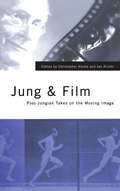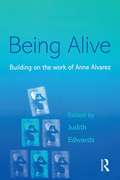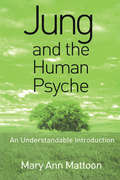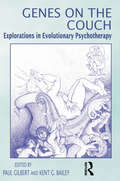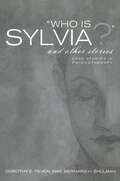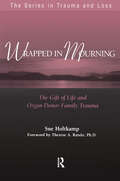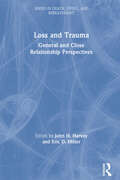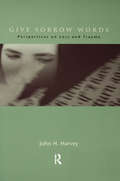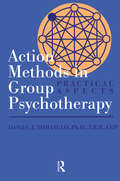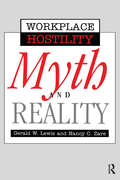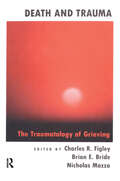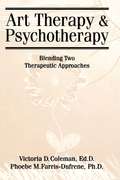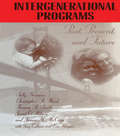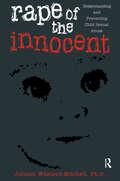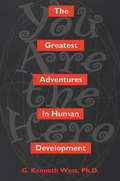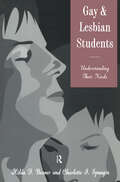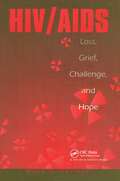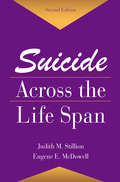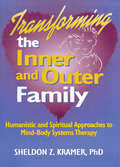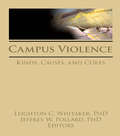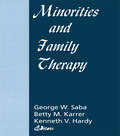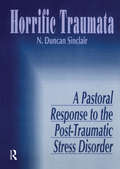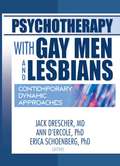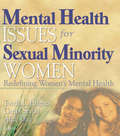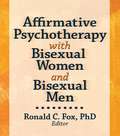- Table View
- List View
Jung and Film: Post-Jungian Takes on the Moving Image
by Christopher Hauke; Ian AlisterJung and Film brings together some of the best new writing from both sides of the Atlantic, introducing the use of Jungian ideas in film analyis. Illustrated with examinations of seminal films including Pulp Fiction, Blade Runner, and 2001 - A Space Odyssey, Chris Hauke and Ian Alister, along with an excellent array of contributors, look at how Jungian ideas can help us understand films and the genres to which they belong. The book also includes a glossary to help readers with Jungian terminology. Taking a fresh look at an ever-changing medium, Jung and Film is essential reading for academics and students of analytical psychology, as well as film, media and cultural studies.
Being Alive: Building on the Work of Anne Alvarez
by Judith EdwardsThis book is a celebration of the work of Anne Alvarez, an enormously influential psychoanalytic psychotherapist whose work on autism and severe personality disorders in children has been important internationally. This book:* brings together assessment of the influence of Alvarez's work across a range of child psychotherapy and related areas* evaluates how her ideas affect the most current developments in these areas* includes contributions from renowned psychoanalysts and psychotherapists from around the world. It will be of great interest to child and adolescent psychotherapists in training and practice, and also to clinical psychologists, psychoanalysts and psychiatrists working with autistic/severely disturbed children.
Jung and the Human Psyche: An Understandable Introduction
by Mary Ann MattoonJung and the Human Psyche: An Understandable Introduction presents a comprehensive introduction to Jungian theory, taking the reader through the major themes of Jung's work in a clear way, relating such concepts to individual experience. Drawing on her extensive experience in practicing and teaching Jungian psychology, Mary Ann Mattoon succeeds in making the fundamental insights of Jung's work accessible. The major topics of Jungian psychology are presented in a manner that is clear, emotionally engaging, well illustrated and non-dogmatic. Areas covered include: The visible psyche: ego, persona, typology. The hidden psyche: self, shadow, unconscious, archetypes, instincts. Becoming who we are: early development, gender. Obstacles and helps to growth: complexes, projection, psychopathology. Helps from the psyche: psychic energy, self-regulation/compensation, symbol, synchronicity, creativity. Jung and the Human Psyche provides an original and imaginative introduction to Jung's work, and will appeal to students of Jungian psychology, those considering training in Jungian analysis, and anyone interested in Jungian psychology.
Genes on the Couch: Explorations in Evolutionary Psychotherapy
by Paul Gilbert Kent G. BaileyPhilosophers and therapists have long theorised about how psychological mechanisms for love, jealousy, anxiety, depression and many other human characteristics may have evolved over millions of years. In the dawn of the new insights on evolution, provided by Darwin's theories of natural selection, Freud, Jung and Klein sought to identify and understand human motives, emotions and information processing as functions deeply-rooted in our evolved history. Despite this promising start and major developments in modern evolutionary psychology, anthropology and sociobiology, the last fifty years has seen little in the way of therapies derived from an evolutionary understanding of human psychology. The contributors to this timely book illuminate how an evolution focused approach to psychopathology can offer new insights for different schools of therapy and provide a rationale for therapeutic integration.Genes on the Couch brings together respected clinicians who have integrated evolutionary insights into their case conceptualisations and therapeutic interventions. Various psychotherapy schools are represented, and each author provides illustrative examples of the interventions used. Specific topics addressed include the nature of evolved mental mechanisms; regulation/dysregulation of internal processes; attachment and kinship in therapy; the importance of internalising warmth as a therapeutic goal; kin selection and incest avoidance; co-operation and deception in social relations; difficulties in working with certain male clients; gender differences in therapy and the roles of shame and guilt in treatment.Providing up-to-date summaries of recent thinking in this increasing important but diverse area, Genes on the Couch will be of interest to psychotherapists, psychiatrists and a wide range of mental health professionals.
Who Is Sylvia? and Other Stories: Case Studies in Psychotherapy
by Dorothy E. Peven Bernard H. ShulmanFirst published in 2002, in this innovative book two leading practitioners tell the stories of the people they have met as clients and how they, as therapists, tried to help them. Through compelling case studies, Peven and Shulman invite the reader into their thoughts and feelings about their clients, their processes and treatment techniques, and their subsequent successes and failures. The authors describe a cognitive, constructivist, interpersonal, dynamic approach based primarily on the principles of Alfred Adler's Individual Psychology. The case studies represent several different DSM-IV diagnostic categories, and the authors offer their own theoretical perspectives and treatment methods for each category. With compassion, insight, and skill, the authors take complicated material and present it in a clearly written and easy to understand fashion.
Wrapped in Mourning: The Gift of Life and Donor Family Trauma (Series in Trauma and Loss)
by Sue HoltkampBased on 15 years of experience working with organ procurement organizations and donor families, Wrapped in Mourning addresses the heretofore unexplored subject of organ donor family trauma. This book covers the issues surrounding organ donation, including the history of organ transplantation, how organs are procured for transplantation, as well as the medical procedure itself. Each issue is explored with regards to its impact upon donor families. Ways to reduce grief, prevent problems, and increase the benefits of donating organs for the donating family are also discussed.
Loss and Trauma: General and Close Relationship Perspectives (Series in Death, Dying, and Bereavement)
by John H. Harvey; Eric D. MillerGiven the relationship between trauma, loss, and interpersonal bonds, the editors have assembled a noteworthy list of contributions discussing trauma associated with close relationships (divorce, infertility, widowhood). Certainly, trauma is closely associated with loss. This edited volume offers the perspective of over twenty leading scholars in the study of trauma and loss. Each chapter offers extensive coverage of contemporary issues (terror management, rational suicide, spirituality, stigmatization). Relationship issues within these topics are also explored.
Give Sorrow Words: Perspectives on Loss and Trauma (Series in Death, Dying, and Bereavement)
by John H. HarveyThroughout our lives, we are influenced by the sensation of loss. Whether implicit or obvious, the impact of this sense of loss affects our daily thinking and behavior. This new text provides a comprehensive introduction to the study of loss via exploration into three major types of loss: loss of important relationships (divorce or perhaps the dissolution of important relationships and friendships); losses that damage who we are, our self-esteem (loss of employment); and losses resulting from victimization (being the target of violence or prejudice; loss of home in a natural disaster). Students of sociology, theology, and family studies will find this text of key interest. Moreover, professionals in these fields, including the fields of trauma and loss, will appreciate the thorough literature review, practical language, clinical interventions, and case highlights.
Action Methods In Group Psychotherapy: Practical Aspects
by Daniel J. TomasuloFirst published in 1999. Routledge is an imprint of Taylor & Francis, an informa company.
Violence In The Workplace: Myth & Reality
by Gerald Lewis Nancy ZareVisit www.geraldlewis.com for more information.
Death And Trauma: The Traumatology Of Grieving (Series in Trauma and Loss)
by Charles R. Figley Brian E. Bride Nicholas MazzaFirst published in 1997. Although the fields of thanatology and traumatology have received robust attention during their parallel development, little effort has been made to address their overlapping territory. This volume is the first attempt to do so. Specifically, the purpose of this book is fourfold. First is to provide a theoretical bridge between the two fields by providing conceptual terminology, such as defining normal versus dysfunctional bereavement and the meaning and range of death-related PTSD. The second confirms and illustrates the identical patterns of reactions between those who survive the death of a loved one and those who survive other traumatic events. Next the book applies the most useful theoretical models to the bereavement experience, and in turn acknowledges the utility of generalizing bereavement models to other traumatic experiences; in doing so, the two fields can enrich each other. Similarly, the volume's final purpose is to identify and apply the most useful and effective approaches in traumatology literature to the study, diagnosis and treatment of traumatic stressors other than death.
Art Therapy And Psychotherapy: Blending Two Therapeutic Approaches
by Victoria D. Coleman Phoebe Farris-DufreneFirst published in 1996. Routledge is an imprint of Taylor & Francis, an informa company.
Intergenerational Programs: Past,Present And Future (Intergenerational Communication Ser.)
by Sally NewmanFirst published in 1997. Routledge is an imprint of Taylor & Francis, an informa company.
Rape Of The Innocent: Understanding And Preventing Child Sexual Abuse
by Juliann Whetsell MitchellWritten for mental health professionals, crisis hot line workers, educators and clergy, this resource discusses how to prevent and recognise child sexual abuse and what to do if abuse is suspected. The content covers many settings in which sexual abuse may occur, including the home, day care and group settings. A special section addresses abuse of minority children and those who are handicapped. The author has also included a glossary of terms relevant to the study and prevention of abuse.
The Greatest Adventures In Human Development: You Are The Hero
by G. Kenneth WestThis undergraduate psychology text acknowledges the diverse backgrounds and learning styles of students by blending Adlerian "tasks of life" with the developmental psychology of Adler, Catalano, Dreikurs, Erikson, Fowler, Fromm, Gilligan, Hoffberger, Kierkegaard, Kohlberg, Levinson, Maslow, May, Piaget, Rogers, Sekkaran and Sternberg. Each chapter examines one of life's greatest adventures and offers the wisdom and advice of psychologists and counsellors most familiar with that aspect of life. Chapters cover adventures such as birth, loss, loving, leaving, growing up, growing old, children who succeed and fail, stagnant and fulfilling careers, faith, despair and crisis and transformation. Reflection questions precede each chapter to stimulate class discussion.
Gay And Lesbian Students: Understanding Their Needs
by Hilda F. Besner Charlotte I. SpunginIn an average US secondary school 10% of the student population is homosexual, yet only a small number of American school districts have taken positive steps to address the problems associated with gay and lesbian students in the predominantly heterosexual educational setting. This book aims to raise awareness of the problems encountered by these adolescents in schools and of the effects of these problems on the dropout rate, academic achievement, substance abuse, AIDS, teenage pregnancy, school violence and suicide.; Designed to promote understanding and dispel myths about gay and lesbian tennagers, the volume also makes curriculum suggestions to advocate self-acceptance and tolerance and to reduce homophobia among heterosexual teenagers. It seeks to explain how institutional homophobia has affected the belief system and behaviour of a large segment of the American population. Various themes concerning the origins of sexual development are discussed, as is information concerning students who are children of gay and lesbian parents.
Hiv/Aids: Loss, Grief, Challenge And Hope
by Mary O'DonnellFirst published in 1996.This guide for professionals who are working in the complex area of HIV/AIDS provides practical guidance and solutions. Each chapter describes specific needs and solutions based on the options available and personal choice.
Suicide Across The Life Span: Premature Exits (Death, Education, Aging and Health Care)
by Judith M. Stillion Eugene E. McDowellFirst published in 1996. The complexities of suicide are examined from the developmental viewpoint. The text includes appropriate case studies, and three research studies, which were conducted especially for this work.
Transforming the Inner and Outer Family: Humanistic and Spiritual Approaches to Mind-Body Systems Therapy
by E Mark Stern Sheldon Z KramerThis enlightening book integrates humanistic and transpersonal psychotherapy principles with family systems work. Transforming the Inner and Outer Family discusses a wide range of creative methodologies, such as the use of meditation, guided imagery, and energy centers in the body to bridge the inner and outer experiences of the individual and family members. Chapters explore the healing capacity of intense affect to unify significant others through the transformation of fear, anger, and grief to understanding, compassion, love, and forgiveness. The book is practical as well as theoretical, containing many case studies focusing on individual, couples, and family therapy. In addition, a special chapter is included on the use of family of origin sessions. Transcripts of actual cases show detailed methods of entering into the therapy system to promote change and demonstrate the operational definition of spirituality and its practical utilization in psychotherapy. Also included is a special candid interview between the author and Virginia Satir, mother of family therapy, nine months before she died, on her personal and professional life.Transforming the Inner and Outer Family presents an integrative family systems model that emphasizes the coordination of existential, humanistic, and transpersonal healing psychologies. This model coordinates Virginia Satir’s later thinking with Roberto Assagioli’s model of psychosynthesis. Author Sheldon Kramer blends principles of psychosynthesis with family systems work and thoroughly explains the use of his new model, Mind-Body Systems Therapy,™ including: development of internal family configurations the spiritual dimension within the systemic context integrating the use of the body with meditation in healing practices methods of healing the inner nuclear and intra-generational family bridging the inner and outer familial world stages of inner and outer healing the use of self in therapyTransforming the Inner and Outer Family is on the cutting edge of current emerging interests in alternative medicine, especially in holistic principles of healing, with emphasis on the spiritual dimension as a major healing conduit for transformation. Readers will discover in this book a solid theoretical base that integrates traditional psychology, including psychodynamic/object relations theory, with less-mainstream forms of psychotherapy, and will learn effective strategies for helping individuals, couples, and families heal.
Campus Violence: Kinds, Causes, and Cures
by Leighton Whitaker Jeffrey PollardThis timely book shows how the rapidly increasing phenomenon of violence in the U.S. is invading college and university campuses. Campus Violence shows what colleges, universities, and other schools can do to deconstruct the violence culture and begin to educate for a better society. The chapters assist educators in determining the nature of both external and internal violence and what to do about it. Readers will benefit from the experiences of many institutions of higher learning as communicated by various outstanding contributors to this book. By becoming sharply aware of the issues and solutions, administrators may engage in better, more realistic long-range planning, as well as get help for the myriad daily questions and problems inherent to running today’s campuses.As a whole, the book is devoted to highlighting important kinds, causes, and cures of violence destructive to living and learning opportunities. The contributors address the full range of issues from conceptualization to practical ways of handling violent behaviors. Section I: Addresses the broadest, most far-reaching views of campus violence: the conceptualization of campus violence, administration perspectives, the destructive concoction of alcohol and other drugs and morbidity, and the commercial promotion of mindless violence. Section II: Addresses specific kinds of violence. Section III: Focuses on the most frequent immediate perpetrators--male college students--and how their behavior can be dealt with and improved. Section IV: Focuses very specifically on how the college counselor or psychotherapist can be a consultant to staff and faculty in regard to disruptive students.Campus Violence depicts the need to nurture and develop atmospheres for learning, respect, and constructive action--arguably the most pressing topic in education today. Counselors, therapists, security officers, deans, and presidents can begin to counter the rapidly increasing phenomenon of violence in American colleges and universities and cultivate a positive leadership atmosphere. The implications of the contributing authors reach to the primary and secondary schools in our nation--the training grounds for college life and education--and provoke some questions which begin to create a better learning environment.
Minorities and Family Therapy
by Kenneth Hardy Betty Mackune-Karrer George SabaMinorities and Family Therapy highlights the work of experienced, sensitive clinicians who, along with minority families, have found creative solutions to the problems minority families present. Until now, the field of family therapy has paid little attention to the specific clinical needs and strengths of minority families. Without sufficient exploration and training, family therapists risk treating minority families from a narrow, incomplete perspective, filtering out their inner resources, values, legacies, history, and wisdom, and underestimating the influence of the social settings in which they live. This unique and highly valuable book explores how systems-oriented clinicians presently work with ethnic and racial minority families. The chapters cover a wide range of clinical issues including pitfalls of misunderstanding and discrimination, innovative strategies for treating drug abuse and AIDS, and skills needed in caring for particular minority groups, such as Native Americans, blacks, Latinos, and Asian Americans. The authors go beyond simply spelling out cultural similarities and differences. They provide clear, clinical suggestions to be applied in family and community contexts. Not just another book on ethnicity, Minorities and Family Therapy looks at families who, because of their race and cultural background, have had to struggle with racism, discrimination, limited access to health care, economic bankruptcy, and educational barriers. Written for family therapists and health care providers who work with minority families and look for creative alternatives to improve their care, this landmark volume is a celebration of the strengths that minority families demonstrate in coping with long-term adversity.
Horrific Traumata: A Pastoral Response to the Post-Traumatic Stress Disorder
by William M Clements Norma J SinclairHorrific Traumata shares the stories of persons whose meaning, hope, and faith were ripped from them by others or traumatic events and who live with Post-Traumatic Stress Disorder. Since the Vietnam War, therapists have come to understand victims of severe emotional trauma with new understanding and, with better ability, have come to learn how to heal the awful effects of their traumas. Now the ranks of traumatized Vietnam veterans are joined by others who have also experienced horrific traumata and need help to rebuild their lives from Post-Traumatic Stress Disorder (PTSD)--victims and survivors of incest and rape, hostage situations, and other events outside the range of ordinary human suffering.Duncan Sinclair provides direct insight into the clinical and psychological aspects of PTSD. He presents a clear and workable understanding of the nature of PTSD which gives clergy and other involved persons direct insight into the causes of many behaviors. Horrific Traumata focuses on the church’s readiness and obligation to incorporate traumatized victims into the center of grace and healing. Clergy of all specialities now have a means of seeing behind the masks of hurt and isolation to the long-standing and disabling trauma. Sinclair shows how to promote the healing process through a range of parish activities as well as in clinical settings. Guidelines for promoting healing include the key concepts of how to listen compassionately and how to create safe places in which victims may heal during the rebuilding of hope and faith. Scriptures used throughout develop a hopefulness that must be maintained for healing. Based on the quintessential understanding that current life stressors open past wounds in ways that leave them open, Sinclair guides professionals and clergy in treating the whole traumatized person. Clergy of all specialities, pastors, chaplains, pastoral counselors, seminary students, clinical pastoral educators, and students will find healing words for hurting people in this book. Clinical specialists in all disciplines who wish to view clients’lives from a clinical and faith position will find the stories and clinical suggestions in this book to be a modern goldmine.
Psychotherapy with Gay Men and Lesbians: Contemporary Dynamic Approaches
by Jack Drescher Ann D'Ercole Erica SchoenbergExamine gay and lesbian psychoanalysis from a variety of perspectives! Psychotherapy with Gay Men and Lesbians: Contemporary Dynamic Approaches presents case histories of psychotherapy sessions with gay and lesbian patients, focusing on today's psychoanalytical approaches. Dedicated to enhancing the emotional, psychological, and psychiatric treatment of gay men, lesbians, and bisexuals, the book features prominent analysts with a wide range of clinical and theoretical approaches. The foremost experts in the therapeutic field address issues affecting gay and lesbian patients from psychoanalytic perspectives that respect the patients' sexual identities. Psychotherapy with Gay Men and Lesbians reflects the significant clinical and theoretical changes therapists face in dealing with issues of gender and sexuality. New ways of thinking coexist with traditional theory as paradigm shifts in psychotherapy and psychoanalysis affect the treatment of gay, lesbian, and bisexual patients. This book provides a forum to address those changes through clinical papers and discussions. Psychotherapy with Gay Men and Lesbians includes discussion of case reports that deal with: gay therapists treating gay patients countertransferential enactments of sex and gender in treatment rethinking the meanings of homosexuality psychotherapeutic treatment of gay male patients with AIDS and much more! Psychotherapy with Gay Men and Lesbians is an essential forum for the exchange of clinical information on gay and lesbian psychotherapy. The book is a valuable resource for psychiatrists, psychologists, social work therapists, psychoanalysts, and anyone interested in today's psychoanalytic approaches to homosexuality.
Mental Health Issues for Sexual Minority Women: Redefining Women's Mental Health
by Tonda Hughes Carrol Smith Alice DanGet a full understanding of lesbian mental health concerns! Mental Health Issues for Sexual Minority Women: Redefining Women's Mental Health presents much-needed research on sexual orientation and sexual minority populations missing from most mental health studies. This unique book identifies three areas of concern voiced in a 1999 Institute of Medicine report on lesbian health: whether lesbians are at a higher risk of mental health problems; the need for a better understanding of lesbian orientation and diversity in the lesbian population; and the need to eliminate barriers to mental health care services for lesbians. Mental Health Issues for Sexual Minority Women addresses those concerns with theoretical and empirical work that represents a broad range of disciplines and cultures. Mental Health Issues for Sexual Minority Women covers a unique and diverse range of topics missing from most books on lesbian health. The book includes original research on issues such as: body image and attitudes toward eating and dieting relationship satisfaction and conflicts substance use and sexual victimization risk factors for psychological distress among African-American lesbians and much more! Mental Health Issues for Sexual Minority Women also includes reviews of literature on traumatic victimization, internalized homophobia, and mental health issues for lesbians with physical disabilities. This groundbreaking book is a unique resource for health researchers, clinicians, academics, and students in any health profession, including nursing, medicine, public health, social work, psychology, and sociology.
Affirmative Psychotherapy with Bisexual Women and Bisexual Men
by Ronald C. FoxLearn the latest practical-and bisexually affirmative-approaches to helping bisexual clientsClinical work with bisexual clients has conceptually shifted beyond the exclusive emphasis on either straight or lesbian and gay issues. There are still, however, too few psychotherapists who provide affirmative psychotherapy specific to bisexual concerns. Affirmative Psychotherapy with Bisexual Women and Bisexual Men addresses the issues of bisexuals with an accepting and affirmative perspective, providing therapists with the latest viewpoints, strategies, and research to effectively treat bisexual clients. Leading authorities with affirmative-to-bisexuals perspectives discuss problems specific to bisexuals and their lifestyles, with an eye toward providing practical, effective therapy. Unique bisexual lifestyle concerns are examined, such as transgender issues, polyamory, older bisexual women and men, and cultural differences, while providing an emphasis on cultivating well-being and a sense of community in bisexual clients.Affirmative Psychotherapy with Bisexual Women and Bisexual Men sensitively avoids the double standard long held by therapists clinically treating heterosexual or lesbian and gay individuals, showing that an affirmative viewpoint is valid and crucial for the effective treatment of bisexuals. This source clearly explains practical strategies and discusses the latest research on bisexual issues such as age, culture, heterosexual and bisexual mixed couples, and the polyamorous lifestyle with appropriate acceptance and understanding. The book also explores useful ways to develop successful health and support services specific to bisexual needs.Topics in Affirmative Psychotherapy with Bisexual Women and Bisexual Men include: affirmative psychotherapy techniques specific to bisexual women and bisexual men need for validation of bisexuality ways for clients to come to terms with their bisexuality practical value-and shortcomings-of the main therapeutic schools in providing effective psychotherapy transgender bisexuality, with illustrative case studies needs and issues of African-American bisexual clients bisexual aging issues counseling heterosexual spouses of bisexual women and men therapy approaches for clients who are bisexual and polyamorous recognizing and addressing the specific needs of different sub-groups of bisexual people and more! Affirmative Psychotherapy with Bisexual Women and Bisexual Men is a crucial addition to the literature of bisexual psychotherapy and is invaluable to counselors, psychotherapists, marriage and family therapists, social workers, psychiatrists, sex therapists, researchers, and educators in the fields of psychology, sociology, anthropology, sexuality, sex education, adolescent and adult development, and community mental health.
